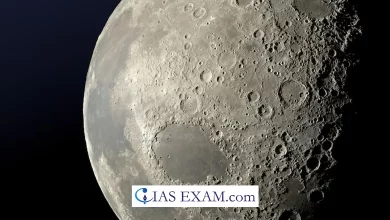
Context
Recently, across the world, it is being experienced that the 4th global coral bleaching event is in progress which is witnessed by the scientists of National Oceanic and Atmospheric Administration (NOAA).
What is Coral Bleaching
- Coral bleaching is a very difficult process that involves the dissolution of pivotal partnership between corals and their symbiotic algae – zooxanthellae.
- These microscopic algae belong to the plants and live in the coral tissues, in a mutual profit forming the association.
- The zooxanthellae (algae) create oxygen and other nouns, such as glucose, glycerin, and amino acids that provide energy for the coral.
Factors that leads to Coral Bleaching
- Bleaching of corals is mainly attributed to different stresses that act on the corals as well as their symbiotic algae.
- The stress of coral, its basic response to climate change induced ocean heat or El Nino, is the main trigger.
- Knowing that stressful corals expel zooxanthellae which these corals used to feed from, leads to coral bleaching and loss of vibrant colours.
- In addition to habitat destruction, other stressors, including pollution, sedimentation, and chemical contaminants, are the culprits that erode corals and make the condition for bleaching.
- Besides, prolonged excessive sunlight exposure and environmental factors like ocean acidification, serve as enhancers of coral bleaching which leads to coral illness and then to marine ecosystem poor health.
Impact of Coral Bleaching
- Coral bleaching is considered as one of the major causes of losing biodiversity in the marine ecosystems, destroying food chains and endangering many species.
- Economically Coral reefs‘ collapse negatively affects fishing, tourism, and coastal shielding, directly affecting workers’ jobs depending on them.
- Coastal Cities become more prone to crumbling coastlines and devastating storms when coral reefs, a barrier to the seas, degrade and no longer provide much needed protection.
- The Ecosystem services produced by coral reefs, i.e. carbon capture and shoreline protection services are in danger because of bleaching events.
- Another aspect of coral bleaching is the establishment of climate change feedback loops by reducing the reefs’ capacity to absorb carbon dioxide, thus making climate warming even worse.
- The need for swift global involvements that inhibit coral reefs cessation by CO2 emission reduction and improvement of reef management regimes is paramount.
All About the 4th Global Coral Bleaching Event
- The world is now into the fourth global coral bleaching that scientists from NOAA have been tracking which is the second in the last ten years.
- The reduction in coral cover record in the Atlantic, Pacific, and Indian Ocean basins has been well observed worldwide through the sea surface temperature data by NOAA’s Coral Reef Watch (CRW).
- Extensive coral bleaching has been listed from February 2023 to April 2024 in the Northern and Southern Hemisphere across the primary ocean basins, according to Derek Manzello, Ph.D., the NOAA CRW coordinator.
- Both the Red Sea, Persian Gulf, Gulf of Aden, and other parts of the Indian Ocean basin’s regions have confirmed mass bleaching of both corals and their ecosystems.
- In addition, NOAA received institutions reporting massive bleaching on areas such as Tanzania, Kenya, Mauritius, Seychelles etc. The case on the Western coast of Indonesia was no exception.
- Indirect consequences of coral bleaching include socio-economic, labour and food challenges despite coral regeneration if distress reduces.
- NOAA Coral Reef Conservation Program (CRCP) emphasises resilience-based management strategies and coral restoration by putting in importances the Interventions Report from 2019.
- The International Coral Reef Initiative (ICRI) that NOAA co-chairs, shares and applies resilience based management actions and lessons learned with a goal to advance coral interventions and restoration in the face of climate change through scientific research and applying its Action Plan.
Conclusion and Way Forward
- To address the ongoing global coral bleaching problem, there is an urgent need for a concerted global action.
- Initiatives should be seen as a priority to be directed towards mitigating CO2 emissions and advocating for sustainable coral reef management to protect these ecosystems.
- That coral bleaching at all these ocean basins is of this magnitude suggests a dire condition.
- NOAA’s programs such as the use of resilience management strategies and coral restoration provide a basis on which global marine resources can operate.
- It is important to engage in collaborative projects, including the International Coral Reef Initiative, which serve for knowledge sharing and implementation of coral interventions that help to minimise the effects of climate change on these important ecosystems.
Source: The hindu
UPSC Mains Practice Question
Q. Discuss the environmental and ecological implications of coral bleaching, including its causes, consequences, and potential mitigation strategies.





.png)



